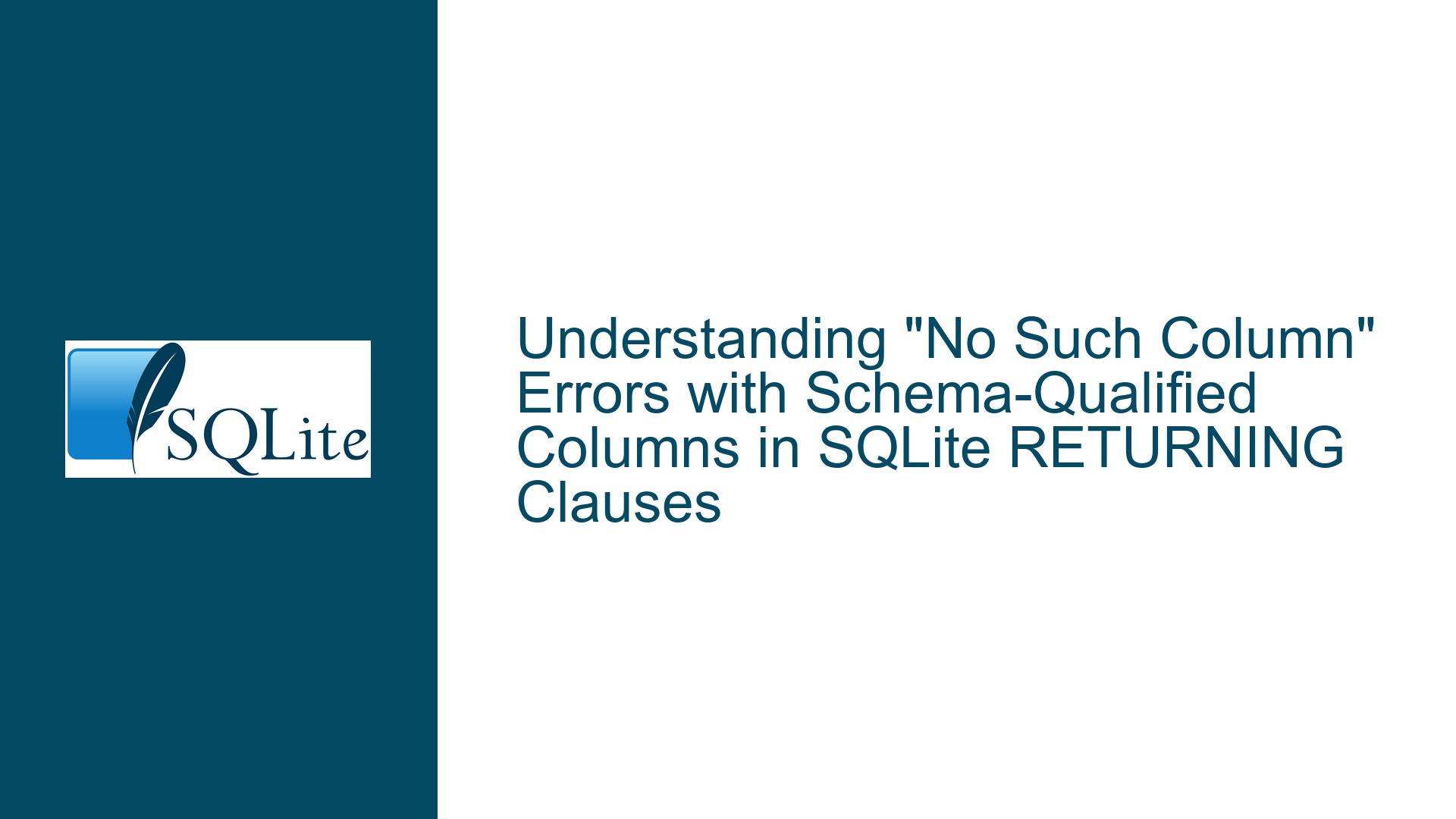“No Such Column” Errors with Schema-Qualified Columns in SQLite RETURNING Clauses
Schema-Qualified Column References in RETURNING Clauses: Parsing Limitations and Workarounds
Issue Overview: Schema Prefixes in RETURNING Clauses Trigger "No Such Column" Errors
SQLite’s RETURNING clause provides a convenient way to retrieve values from newly inserted or updated rows. However, when columns in the RETURNING clause are prefixed with their schema or table name (e.g., main.table.column), SQLite raises a "no such column" error, even if the column exists. This behavior diverges from PostgreSQL, where schema-qualified column references in RETURNING clauses are valid. The discrepancy creates compatibility challenges for applications or ORMs (e.g., Diesel in Rust) that generate SQL with fully qualified column names by default.
Technical Breakdown
The RETURNING clause in SQLite is designed to reference columns exclusively from the target table of the INSERT or UPDATE operation. While SQLite’s parser allows table-qualified column names (e.g., table.column) in some contexts, schema-qualified names (e.g., schema.table.column) are not parsed correctly in RETURNING clauses. This occurs because SQLite’s grammar for RETURNING treats schema prefixes as part of the column identifier itself. For example, main.test.id is interpreted as a single column named main.test.id, not as the id column from the test table in the main schema.
Impact on ORMs and Cross-Database Compatibility
ORMs like Diesel generate SQL with fully qualified column names to avoid ambiguity in complex queries (e.g., joins, CTEs). In PostgreSQL, this is valid because RETURNING allows schema-qualified references. However, SQLite’s stricter parsing forces developers to either modify ORM behavior or write database-specific exceptions. This undermines code portability and increases maintenance overhead.
Example Failure
Consider this minimal reproduction:
CREATE TABLE test (id INTEGER, name TEXT);
INSERT INTO test VALUES (1, 'test') RETURNING main.test.id;
SQLite returns:
Runtime error: no such column: main.test.id
Omitting the schema prefix (RETURNING id) resolves the error, confirming the parser’s inability to resolve schema-qualified columns in this context.
Possible Causes: Grammar Restrictions and Parser Ambiguities
Grammar Rules for RETURNING Clauses
SQLite’sRETURNINGclause is parsed using a simplified grammar that does not account for schema or table qualifiers. The parser treats identifiers inRETURNINGas column names without considering their hierarchical context (schema → table → column). This contrasts withSELECTstatements, where schema and table qualifiers are resolved through name resolution rules.Name Resolution in RETURNING
Unlike other clauses (e.g.,WHERE,SELECT), theRETURNINGclause does not perform name resolution against the schema’s object hierarchy. It assumes all column references are unqualified and belong to the target table. Consequently, any prefix (even a table name) is treated as part of the column’s identifier. For example,test.idinRETURNING test.idwould also fail unlesstestis the target table’s name.Cross-Database Attach Scenarios
When working with attached databases (e.g.,ATTACH 'file.db' AS secondary), developers might attempt to reference columns usingsecondary.table.columninRETURNING. This fails for the same reason: SQLite does not resolve the schema/table prefix and instead searches for a column namedsecondary.table.columnin the target table.PostgreSQL Compatibility Assumptions
ORMs designed for PostgreSQL often assume that schema-qualified column names are universally valid inRETURNINGclauses. This creates a false expectation of compatibility with SQLite, leading to runtime errors when the same SQL is reused.
Troubleshooting Steps, Solutions, and Fixes
1. Rewrite Queries to Use Unqualified Column Names
The simplest fix is to remove schema and table qualifiers from column references in RETURNING clauses. For example:
INSERT INTO test VALUES (1, 'test') RETURNING id;
This works because SQLite resolves id unambiguously to the target table’s column.
Adapting ORM-Generated SQL
If your ORM generates qualified names, explore configuration options to disable qualification in RETURNING clauses. For example, Diesel allows customizing query DSLs to omit schema prefixes in specific contexts.
Example (Diesel):
// Override the RETURNING clause generation for SQLite
impl QueryId for MyCustomReturningClause {
type QueryId = ();
const HAS_STATIC_QUERY_ID: bool = false;
}
2. Use Aliases or Subqueries to Bypass Qualification Limits
If unqualified names are impractical (e.g., in complex queries with joins), use a subquery or CTE to alias the target columns:
WITH inserted AS (
INSERT INTO test VALUES (1, 'test') RETURNING id AS aliased_id
)
SELECT aliased_id FROM inserted;
This moves the RETURNING logic into a CTE, allowing aliases to avoid qualification conflicts.
Trigger-Based Workarounds
For advanced use cases, create a trigger that captures inserted/updated values and stores them in a temporary table:
CREATE TEMP TABLE returning_buffer (id INTEGER);
CREATE TRIGGER capture_returning AFTER INSERT ON test
BEGIN
INSERT INTO returning_buffer (id) VALUES (NEW.id);
END;
INSERT INTO test VALUES (1, 'test');
SELECT id FROM returning_buffer;
This bypasses RETURNING entirely but adds complexity.
3. Patch SQLite or Advocate for Grammar Enhancements
For mission-critical applications requiring schema-qualified RETURNING clauses, consider patching SQLite’s parser to support qualified column names. The relevant code is in parse.y (look for the returning_clause rule).
Proposed Grammar Change:
Modify the returning_clause rule to accept schema-table-name . column-name:
// Original rule
returning_clause(A) ::= RETURNING exprlist(X). {
A = X;
}
// Modified rule
returning_clause(A) ::= RETURNING qualified_column_list(X). {
A = X;
}
Submit the patch to SQLite’s team for consideration.
Advocacy and Documentation
Raise awareness by filing an SQLite documentation issue, requesting clarification on RETURNING clause limitations. Engage ORM maintainers to add SQLite-specific workarounds.
Final Notes
While SQLite’s handling of schema-qualified columns in RETURNING clauses is a deliberate design choice, it poses challenges for cross-database tooling. Developers must choose between modifying SQL generation logic, employing workarounds, or advocating for parser enhancements. Understanding these nuances ensures smoother integration with ORMs and minimizes runtime surprises.






